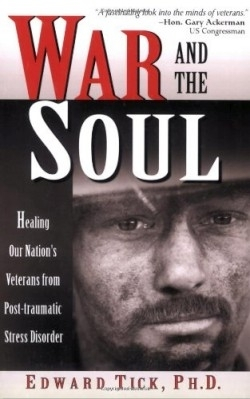War and the Soul
Healing Our Nation's Veterans from Post-Traumatic Stress Disorder
- 2005 INDIES Winner
- Bronze, Psychology (Adult Nonfiction)
Even Gandhi believed that people need the qualities that warriors once possessed, but soldiering, once a constructive rite of passage, has given up most of the glory it once held. Weapons of mass destruction have ruined war. Machine guns, planes, and nuclear weapons so alter the conduct and effects of war that it degrades much more than it enhances combatants. In this remarkable book, the author, a psychotherapist whose previous books addressed the Vietnam war and dreams in healing, surveys the history and mythology of war in general and its psychological consequences in particular.
His chapter titles include “The Soul in Slaughter,” “Eros and Aesthetics in Hell,” “Relations with the Missing and the Dead,” and “The Healing Power of Storytelling.” A straightforward and eloquent writer, he conveys caring and passion concisely, with the authority of an involved witness. Tick worked as a therapist with veterans for twenty-five years; he views standard approaches to post-traumatic stress disorder (PTSD) skeptically. He became a student of war in historical and cross-cultural perspective. The American Civil War marked the emergence of modern military conflict with the devastating effects of weapons that blasted from a distance. World War I soon eclipsed that, and a generation later, a wider, more devastating conflict ended with atomic weaponry.
“In war,” says the author, “chaos overwhelms compassion, violence replaces cooperation, instinct replaces rationality, gut dominates mind. When drenched in these conditions, the soul is disfigured.” Later, he says of combat, “Horror is married to boredom, fascination to putrescence. … Everything is rendered ultimate, just as it is in myth. The tiniest event can be charged with intensity so overwhelming that it literally reprograms the central nervous system.”
At the tribal and national level, war represents divine will, participation in which requires subordination of individual will coupled with elevation of the warrior to heroic status. War used to be a disciplined rite of passage: in some “primitive” societies, combat ended with the first casualty. War functioned as a kind of extreme sport, a proof of manhood; now it undoes men, families, even nations that have come to depend on it. Inhibitions must die in order to create killers. War becomes a reality show only mimicked in video games, never to be shown on television, where recruitments ads beckon: “Be all you can be.”
The author points out that up through the Civil War, senior officers led their troops into battle. Now the “brass” take their positions safely in the rear. This transforms battle from a mentored rite of passage to something quite different. With destruction at a distance, often indiscriminate (civilians), survival trumps heroism as a goal. Even that survival is weighed down with shame and guilt. The ancient values of maturation, heroism, and sanctity have faded away.
Tick quotes relevant sources from Heraclitus to Chris Hedges (War is a Force that Gives us Meaning, 2003), including psychiatrist Robert Jay Lifton, psychologist James Hillman, war biographies, poets, movies, and his patients. People idealize war, he writes, because they need its awesome mythology, its ready connection to the divine, its simplifying ideology. They cannot weigh its real costs, including PTSD, once known as “soldier’s heart” or “nostalgia.” The old, soulful terms imply a return to normal, to wholeness that was damaged, not just by “shell shock” but by killing—an inversion of moral values. Soldiers dehumanize other people in order to kill them, but later, with survivor guilt, veterans question their very souls as victims inhabit memory rehumanized. Conventional therapy for PTSD, which emphasizes medication and avoids moral and spiritual issues (like “soul”) fall short, even as the incidence of the syndrome rises in the current war in Iraq.
Tick cites the fact that homeless veterans number some 270,000, most from the Vietnam War, and that suicides now outnumber fatal casualties from that war. He reasons that PTSD afflicts not only the individual soul, but that of a nation that once basked in the assurance of its goodness and now finds evidence of evil within. Tick asserts that PTSD is an identity disorder that requires healing of a wounded soul. His method connects suffering with the healing power of myth, including reconciliation with the dead and, ironically, attaining the character values of a true warrior. The last four chapters explain this journey: purification and cleansing, the healing power of storytelling, restitution in the family and the nation, and initiation as a warrior.
When it comes to making war and going to war, this book is required reading for those who would do it with informed consent, or would refrain for good reason.
Reviewed by
E. James Lieberman
Disclosure: This article is not an endorsement, but a review. The publisher of this book provided free copies of the book to have their book reviewed by a professional reviewer. No fee was paid by the publisher for this review. Foreword Reviews only recommends books that we love. Foreword Magazine, Inc. is disclosing this in accordance with the Federal Trade Commission’s 16 CFR, Part 255.

